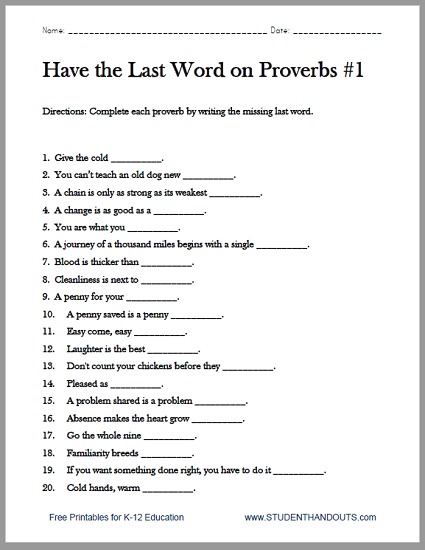

The Proverbs (written by Solomon, the king of peace) also bear certain parallels to the principles of the kingdom of God as the Lord Jesus has set them forth in the so-called Sermon of the Mount in Matthew 5 Matthew 6 Matthew 7. It contains the advice of divine wisdom for daily life of a god-fearing man in all his difficulties, trials, dangers and joys of his way over this earth. The book also teaches that man irrespective of his spiritual blessings under the government of God will reap what he has sowed. The book of Proverbs shows what the god-fearing man in this world shall seek and what he shall avoid. At the same time an enormous difference comes to light: The worldly, heathen maxim is a mixture of moral philosophy and thinking by chance whereas the book of Proverbs of Solomon in the Holy Scriptures considers the fear of Jehovah as aim, which is the beginning of wisdom.


This discovery on the one hand confirms the spreading and popularity of collected proverbs in the Orient. One has found a certain similarity between Proverbs 22:17-29 Proverbs 23:1-11 and the Egyptian book of knowledge of Amenemope. In a time when not everybody was able to read or to write, the learning or knowledge of proverbs was a special form of instruction. Maxims (or aphorisms) played an important part in antiquity. This fixes the beginning and the end of the book's origin. Solomon reigned around 970 to 931 BC and Hezekiah (in whose time many ancient things came to honour) around 716 to 687 BC. Solomon has therefore more likely collected the words of these men than just added them later. The same implies for the "appendix" in Proverbs 30 Proverbs 31 where the name of Agur and Lemuel appear. Also Solomon has probably not compiled all proverbs but taken over already known proverbs by the wise (compare chap. King Hezekiah's men collected some of Solomon's proverbs only 200 years later (compare Proverbs 25:1).

Only around a thousand of Solomon's proverbs are collected in the book of Proverbs and were maintained by divine inspiration and preservation. And there came of all people to hear the wisdom of Solomon, from all kings of the earth, which had heard of his wisdom." And he spoke of trees, from the cedar tree that is in Lebanon even unto the hyssop that springs out of the wall: he spoke also of beasts, and of fowl, and of creeping things, and of fishes. And he spoke three thousand proverbs: and his songs were a thousand and five. For he was wiser than all men, than Ethan the Ezrahite, and Heman, and Chalcol, and Darda, the sons of Mahol: and his fame was in all nations round about. And Solomon's wisdom excelled the wisdom of all the children of the east country (JND: sons of the east), and all the wisdom of Egypt. 1 Kings 4:29-34 states: "And God gave Solomon wisdom and understanding exceeding much, and largeness of heart, even as the sand that is on the sea shore. We do not know anything, however, about their identity.Īs David was the greatest poet of Psalms so Solomon was the greatest poet of Proverbs. Finally chapters 30:1 and 31:1 mention Agur and Lemuel as poets of the proverbs. In chapter 22:17 and 24:23 the proverbs (contained in the sections following these verses) are called "words of the wise". Solomon is also mentioned as poet in chap. The book of Proverbs bears the inspired title: "Proverbs of Solomon, son of David" (chapter 1:1).


 0 kommentar(er)
0 kommentar(er)
